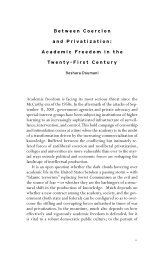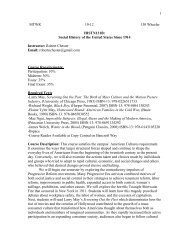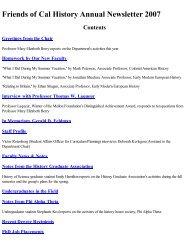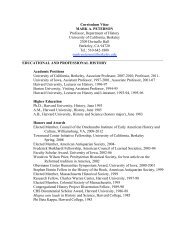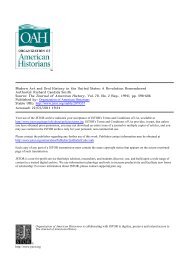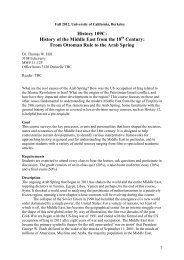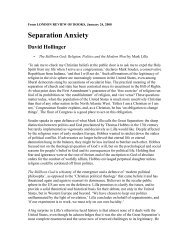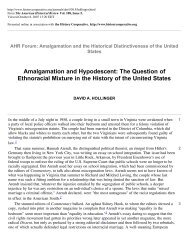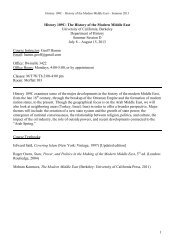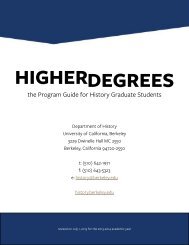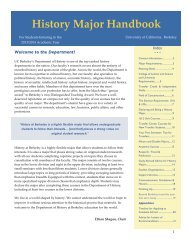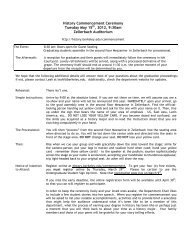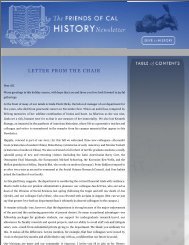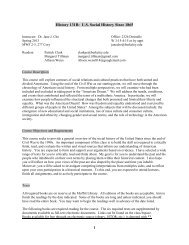My Grandmother and Other Stories: Histories of the Palestinians as ...
My Grandmother and Other Stories: Histories of the Palestinians as ...
My Grandmother and Other Stories: Histories of the Palestinians as ...
You also want an ePaper? Increase the reach of your titles
YUMPU automatically turns print PDFs into web optimized ePapers that Google loves.
Related to <strong>the</strong> totalizing features <strong>of</strong> <strong>the</strong><br />
Great War w<strong>as</strong> <strong>the</strong> manner in which it<br />
transformed <strong>as</strong>pects <strong>of</strong> social norms. In<br />
<strong>the</strong> absence <strong>of</strong> a large number <strong>of</strong> adult<br />
male household members–who were<br />
ei<strong>the</strong>r conscripted or had perished at<br />
<strong>the</strong> front–many families were exposed<br />
to extreme poverty, famine <strong>and</strong><br />
dise<strong>as</strong>e. People were driven to take<br />
dr<strong>as</strong>tic me<strong>as</strong>ures that unsettled <strong>the</strong>ir<br />
lives. Begging, <strong>the</strong>ft, <strong>and</strong> prostitution<br />
became daily features in <strong>the</strong> streets <strong>of</strong><br />
Jerusalem to an unprecedented degree.<br />
Private Ihsan H<strong>as</strong>an al-Turjman, age 22, when he w<strong>as</strong><br />
conscripted in <strong>the</strong> Fourth Army. Source: Turjman family.<br />
The war also contributed to redefining<br />
<strong>the</strong> nature <strong>of</strong> <strong>the</strong> state <strong>and</strong><br />
its relationship to its subjects. In<br />
<strong>the</strong> c<strong>as</strong>e <strong>of</strong> Palestine, <strong>the</strong> war w<strong>as</strong> a<br />
watershed, separating <strong>the</strong> country<br />
from Syrian expanses <strong>and</strong> bringing<br />
British colonial rule, <strong>the</strong>reby creating<br />
new borders, new citizenship, <strong>and</strong><br />
new forms <strong>of</strong> national consciousness.<br />
Yet ano<strong>the</strong>r feature <strong>of</strong> <strong>the</strong> war’s perv<strong>as</strong>iveness w<strong>as</strong> its unanticipated emancipatory<br />
impact on society. This <strong>as</strong>pect is not well-discussed in war literature, which emph<strong>as</strong>izes<br />
ra<strong>the</strong>r <strong>the</strong> war’s dev<strong>as</strong>tation, dehumanization <strong>and</strong> disruption <strong>of</strong> normality. Yet, in<br />
many respects, it w<strong>as</strong> precisely <strong>the</strong> very instruments <strong>of</strong> brutality <strong>and</strong> destruction–<strong>and</strong><br />
particularly <strong>the</strong> disruption <strong>of</strong> normalcy–that accounted for new social horizons in<br />
society. It h<strong>as</strong> been argued, for example, by <strong>the</strong> socialist <strong>the</strong>oretician Anton Pannekoek,<br />
that WWI played a crucial role in mitigating illusions about nationalism, opening<br />
possibilities for cl<strong>as</strong>s solidarities across national boundaries. 2 In <strong>the</strong> aftermath <strong>of</strong> <strong>the</strong><br />
Franco-Prussian war <strong>of</strong> 1870, Engels made a similar analysis concerning <strong>the</strong> impact <strong>of</strong><br />
a future ‘total war’ in which barbarism would give rise to a new civilization. 3 Generally,<br />
<strong>the</strong> movement <strong>of</strong> large numbers <strong>of</strong> young males from rural are<strong>as</strong> to army camps created<br />
a network <strong>of</strong> training grounds for former pe<strong>as</strong>ants in literacy <strong>and</strong> manual skills that<br />
were <strong>the</strong> b<strong>as</strong>is for m<strong>as</strong>s movements <strong>and</strong> radical reform. The short life <strong>of</strong> private Ihsan<br />
al-Turjman highlights not only <strong>the</strong> impact <strong>of</strong> <strong>the</strong>se dislocations on social norms but also<br />
<strong>the</strong> manner in which <strong>the</strong> products <strong>of</strong> <strong>the</strong> late Ottoman educational system (in both <strong>the</strong><br />
Nizamiyyah schools, <strong>and</strong> <strong>the</strong> so-called national (i.e. private but not denominational)<br />
schools began to question <strong>and</strong> challenge <strong>the</strong> fate <strong>of</strong> <strong>the</strong> Arab Ottoman provinces <strong>and</strong><br />
<strong>the</strong>ir future within <strong>the</strong> Empire.<br />
[ 28 ] HISTORICAL FEATURES The Short Life <strong>of</strong> Private Ihsan



